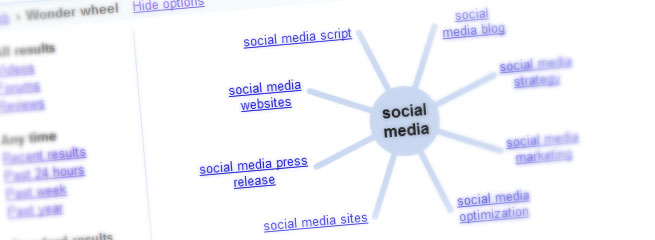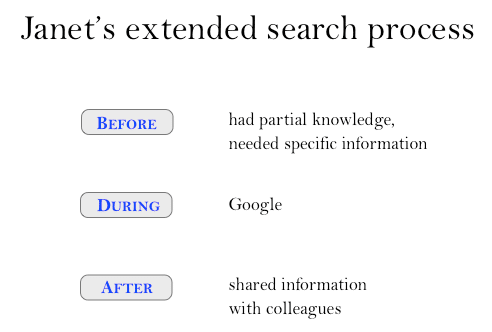Tot nu toe gingen we er vanuit dat online zoeken naar informatie allen gedaan werd:
- in afzondering achter de computer zittend komt een zoeker met een zoekvraag
- de zoeker kiest een zoekmachine
- de zoeker kiest een zoekterm
- de zoeker kiest een zoekresutlaat
- de zoeker heeft interactie met websites (kopen, info lezen etc.))
Twee Amerikaanse wetenschappers (Brynn Evans, Ed H. Chi. Towards a Model of Understanding Social Search. In Proc. of Computer-Supported Cooperative Work (CSCW), (to appear). ACM Press, 2008. San Diego, CA.ontdekken dat online zoeken juist een sociale impact heeft. De resultaten van een zoekopdracht blijven namelijk nog lang nawerken in de sociale omgeving van gebruikers. Ook voor een zoekopdracht wordt ingevoerd vindt er vaak sociale interactie plaats.
Dus dan wordt het zoiets:
- input zoekvraag bespreken met peers, collegas, familie
- in afzondering of samen achter de computer zittend komt een zoeker met een zoekvraag
- de zoeker kiest een zoekmachine
- de zoeker kiest een zoekterm
- de zoeker kiest een zoekresutlaat
- de zoeker heeft interactie met websites
- zoeker bewaardt (bookmark, email, document) en verspreidt de zoekresultaten (mondeling, email)
Meer dan 33% van de deelnemers heeft voor en na het zoeken contact met anderen betreffende de zoektermen en de zoekresultaten. 42% heeft voor het zoeken contact met collega’s en of vrienden over het onderwerp waarnaar wordt gezocht. Zoekresultaten bewaren en delen is de volgende stap, maar liefst 72% doet na een zoekopdracht iets met de zoekresultaten. 67% van hen verspreidt de zoekresultaten onder anderen. 47% bewaart de resultaten als bookmark, in een e-mail of in een document.
Een voorbeeld dat dit sociale zoeken uitlegd is het volgende verhaal:
“A barista (let’s call her Janet) works in a cafe, and couldn’t remember a really good recipe for a special drink. But she can remember just several ingredients in the recipe. She asks her colleagues if they know the drink, and of course she didn’t know the name of the drink. She had partial knowledge of what she needs to know, but only had more specific information to find the recipe. She goes to Google and types in the ingredients and finally finds recipe after some browsing and searching. After she finds the recipe, she prints out the information and shares it with her co-workers in the cafe the next day.
Interestingly, Janet’s extended search process not only extended over a few days, but she also interacted socially around her search process both before as well as after the search. The problem is that Google only sees her interaction with the search engine for a brief period of time, not knowing the entire social process that occurred behind the scene. Perhaps the search engine only saw keywords like “coffee cinnamon honey”, but not how she had obtained some of these ingredients’ name from other co-workers nor how she printed out the result to share with someone.
Janet never had a chance to interact with other baristas (who might be online at that moment) to see if they had a better idea about how to look for the recipe. Her new found knowledge was also not shared with other like-minded community interested in coffee drinks. Delicious and other social tagging sites can be used by groups of people to share what they have found, but the knowledge does not travel easily from the person who found it to the person that needs it efficiently. It seems tool support for social search is still relatively poor.”
De conclusies zijn dat sociaal delen dus vooral gebeurd in de offline wereld en niet via online sociale netwerken als delicious, facebook of hyves
terwijl de interacties idealiter expliciet of impliciet,
in elkaars fysieke nabijheid of op afstand, synchroon of asynchroon verlopen
(Brynn Evans, Ed H. Chi. Towards a Model of Understanding Social Search. In Proc. of Computer-Supported Cooperative Work (CSCW), (to appear). ACM Press, 2008. San Diego, CA.
via NRC weblog en Molblog



Geef een reactie